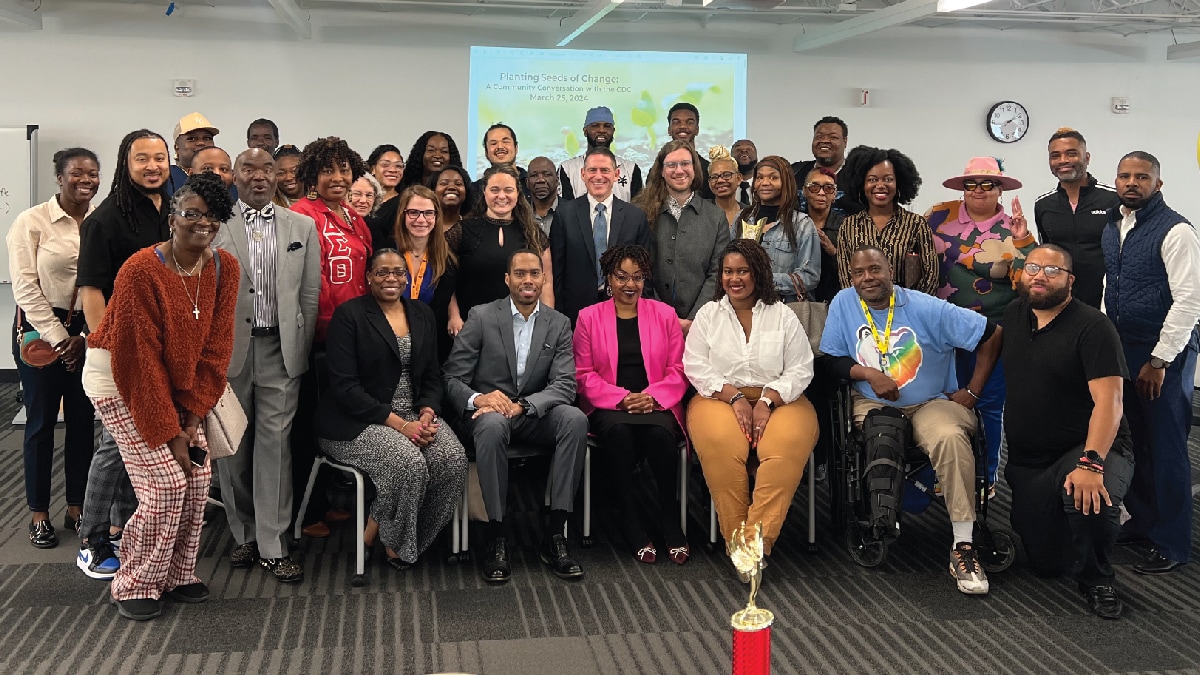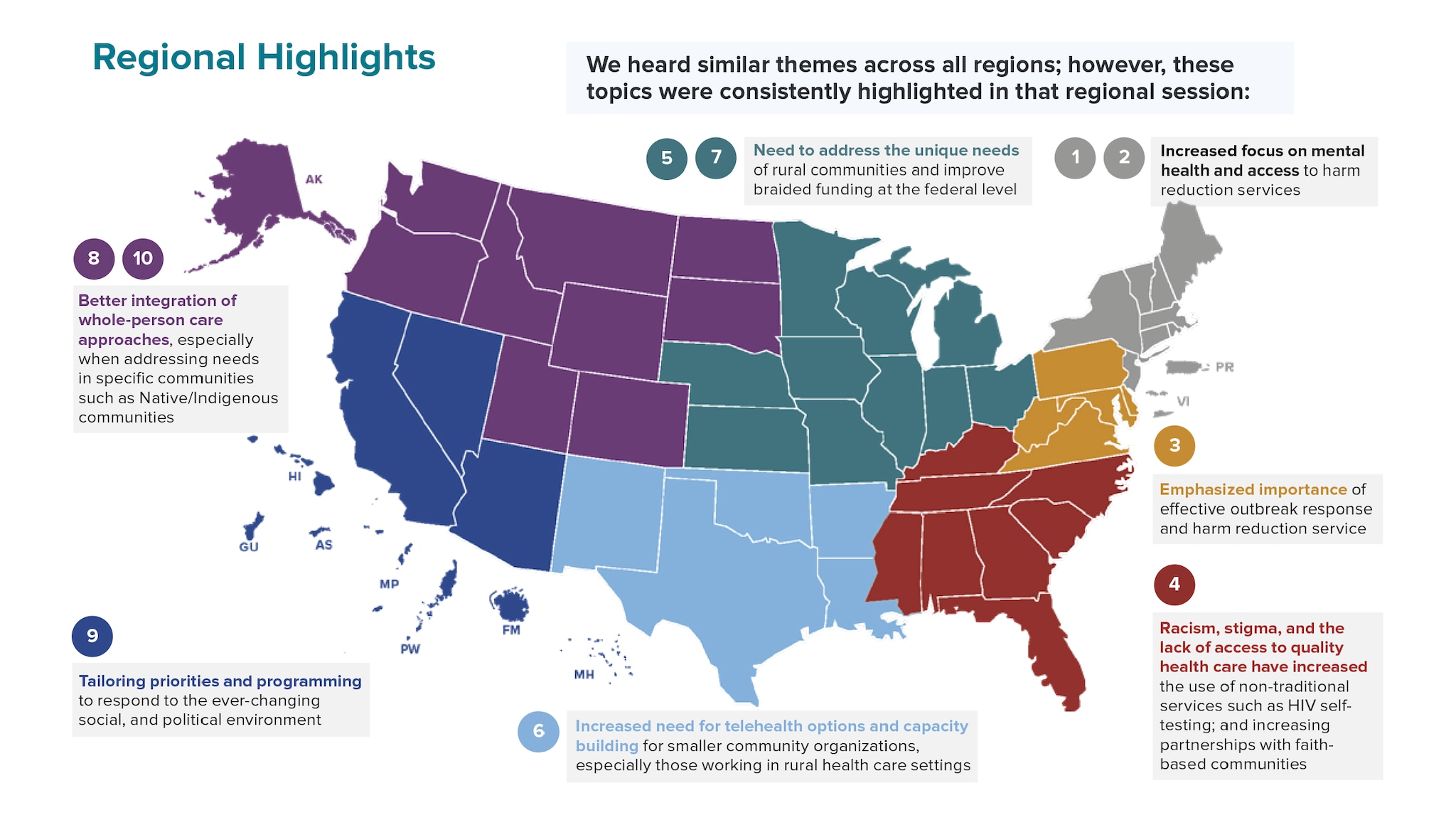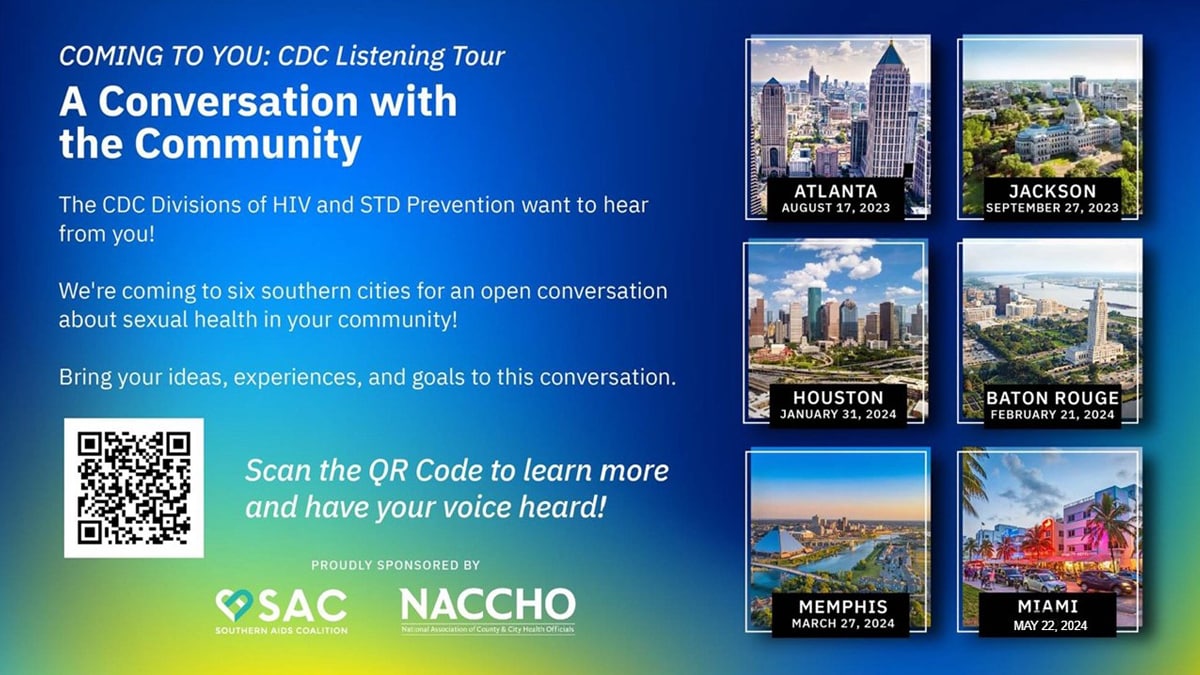What to know
CDC is committed to working with community partners to advance health equity and national HIV prevention goals. In 2022, CDC began convening events with community leaders and members to discuss solutions to advance HIV prevention, diagnosis, treatment, and outbreak response. This page provides information on upcoming community engagement town halls.

Overview
Systemic factors like racism, homophobia, and stigma continue to exacerbate health disparities in HIV outcomes. To eliminate these disparities and achieve national HIV prevention goals, it is crucial to connect disproportionately affected communities with tailored interventions and resources. To do this well, CDC must listen to the communities we serve.
For decades, local community planning has been critical to HIV prevention. CDC collaborates with local and state partners to engage their communities in developing their own locally tailored, community-driven plans. These plans lay the foundation for scaling up the initiative's key strategies to meet local needs, achieve health equity, and optimize HIV prevention and care in these communities. CDC recognizes that community-driven approaches and solutions are vital to addressing barriers and maximizing opportunities to reach our shared HIV prevention goals.
Launched in 2022, the HIV Prevention and Care Priorities Engagement Sessions are a vital part of CDC's broader effort to strengthen communication pathways and relationships with community members, healthcare providers, and public health officials. By integrating new and diverse voices into planning, a comprehensive approach to community engagement can expand prevention initiatives and deliver timely care to those in need.
CDC's HIV Prevention and Care Priorities Regional Engagement Sessions, 2022-2023
CDC's Division of HIV Prevention hosted regional town hall sessions to connect with the community to address these barriers and maximize opportunities to reach our shared HIV prevention goals. Between March 2022 and March 2023, CDC held 15 virtual community engagement sessions in English across all 10 Health and Human Services (HHS) regions, and one in-person session in Puerto Rico in Spanish.
With more than 1,600 participants, these engagement sessions included diverse partners and community leaders. We discussed community-driven solutions to address the longstanding inequities that continue contributing to severe HIV-related disparities, and ways to end the HIV epidemic by leveraging scientific advances in HIV prevention, diagnosis, treatment, and outbreak response.

These themes have helped inform division priorities around funding opportunities, capacity building programs, communication messages and resources, and research.
CDC and HRSA's 2023 Virtual Public Health Leader and Community Listening Sessions
Between June and November 2023, CDC and the Health Resources and Services Administration (HRSA) co-hosted 14 virtual listening sessions with public health leaders and community members across all 10 HHS regions. The series provided an opportunity for participants to share their open and honest feedback on successes and challenges in providing HIV care, treatment, and prevention as we move toward ending the HIV epidemic in the U.S.
Of the 14 listening sessions, seven were public health leader roundtables; the other seven primarily included community members, community-based organizations, community health centers, people with lived experience, Ryan White Program recipients and subrecipients, and CDC funding recipients.
In total, 2,048 people participated in the joint CDC/HRSA listening sessions. Eight of the 14 sessions were held in English with simultaneous Spanish interpretation.
There were five overarching themes that emerged from the 2023 listening sessions:
- Workforce recruitment and capacity building are essential for HIV care and treatment.
- Social determinants of health and stigma continue to affect access to health care.
- Guidance is needed to address barriers to implementing braided funding.
- HIV testing expansion and integrated rapid start protocols would enhance HIV prevention and care efforts.
- People aging with HIV have additional needs.
CDC's Division of HIV Prevention and HRSA's HIV/AIDS Bureau are working in collaboration to address these themes in our research, programming, and funding initiatives.
CDC’s A Conversation with the Community: Southeastern U.S. Engagement Series, 2023-2024
Beginning in August 2023, the Division of HIV Prevention and the Division of STD Prevention began partnering with NACCHO, Southern AIDS Coalition, and regional community conveners to host in-person engagement sessions with community-led and community-serving organizations in the U.S. Southeast—including Atlanta, Jackson, Houston, Baton Rouge, Memphis, and Miami.

The aim of these sessions was to discuss barriers and opportunities to promote health equity, expand community engagement, and understand local programming around syndemic and whole person approaches.
In September 2024, CDC held a final workshop with health departments representing the jurisdictions where the community sessions were held. CDC is now working with partners on a community of practice to help further develop best practices among southern health departments. We will be reporting out the findings of these sessions over the next year in internal and external spaces.
Cross-cutting engagement themes
- Funding for HIV prevention: Enhancing coordination across federal agencies and increase flexible funding.
- Social drivers of health: Addressing issues related to housing, employment, transportation, substance use, mental health, stigma, and financial challenges.
- Capacity building and technical assistance: Strengthening the capacity of grassroots and community organizations to provide whole-person health care.
- Tailoring resources to meet the needs of specific communities: Ensure programming integrates the lived experiences of communities such as Hispanic and Latino people, transgender persons, and people aging with HIV.
- Interventions: Increasing access to PrEP (including long-acting injectables), expanding HIV self-testing, provider PrEP education, and sex education.
- Expanding integrated care through the Ending the HIV Epidemic in the U.S. initiative: Implementing comprehensive, whole-person care and focusing on improving quality of life.
These community engagement sessions will continue to inform CDC's current and future HIV prevention, treatment, and care activities, which include:
- Engaging communities by creating and sustaining new partnerships and ensuring people with lived experiences are heard.
- Improving care by focusing on quality of life for people with HIV.
- Tailoring capacity building and technical assistance approaches.
- Implementing science and research.
- Promoting comprehensive, whole-person care.
